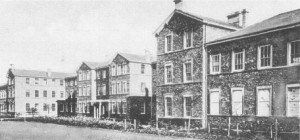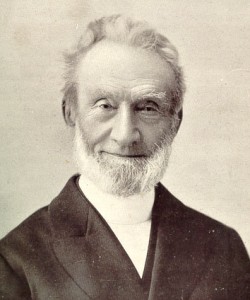From the Category, “The Eastern Eye”
[The Bible is an “Eastern” book. It was written many years ago in the “East” which today we refer to as “The Middle East.” As such, there are many customs and idioms that are not familiar to the “Western” mind.
In understanding the Scriptures it is important for us to understand the culture, but it doesn’t mean that we should necessarily follow that culture. Rather, it is in the understanding of the Eastern culture that we gain light and understanding about many things in the Bible.]
Jesus’ disciples came to him one day asking about how to increase their faith. He gave quite an answer. In fact, the two examples he used in his answer are very enlightening.
Concerning increasing their faith, or believing, he told them that if they had faith the size of a mustard seed they could say to a sycamine tree, “Come up out of there by the roots and go plant yourself in the sea.” And then he said the tree would obey.
In his answer he used a mustard seed and a sycamine tree. The mustard seed of the lands and times of the Bible is the smallest of all seeds. If it got into your eye, you would hardly be aware if it. Yet that mustard seed will grow into a tree, as big as the apple trees here in the United States.
How Much?
So, how much faith do you need? How big does it have to be? The disciples were concerned about increasing their faith so that they could do more, or produce more. Jesus said that all you need is a speck.
That means that when it comes to faith, or believing, it is not the size or amount. Rather, you either believe or you don’t believe. But when you do believe, the results are tremendous, big enough to uproot and replant a sycamine tree.
The sycamine tree mentioned in the Bible is the wild fig tree. And although it produces fruit year round, usually six times a year, most people do not eat the fruit because those figs are very bitter.
What is very interesting is that although the sycamine tree is small, it has an enormous root system. The roots of that tree are varied in size and spread so far and wide, and deep, that even today with our modern machinery it would be impossible to pull out a sycamine tree without leaving some of the roots behind.
But Jesus said that if you have faith, or believing, the size of a mustard seed, you would be able to say to the sycamine tree, be plucked out by the roots. The smallest amount of believing can remove this bitter fruit tree with all of its extensive root system. And not only remove it, but replant it in the sea; replanted under the water far from you.
Have You Ever Thought Abut This?
Consider this for a moment. Was Jesus teaching his disciples how they could get rid of literal trees? Was this a lesson in agriculture? Or is there a much deeper meaning?
I believe he was teaching that we Christians, by believing who we are and who God has made us to be in the new birth, can pluck out negative issues in our lives. In the epistles it talks about putting off the things of the old man nature. It talks about casting down things that are contrary to the Word of God. It talks about forgetting things of the past, laying aside every weight and sin that holds us back.
We all have areas in our lives that we would like to change. But, do any of us have as many issues as the sycamine tree has roots? Jesus was teaching that we can address those issues specifically. By believing who you are, a child of God, empowered with His power, you can command those issues to leave.
For example, you can say to anger, “Anger, be removed from my life and be cast away in the name of Jesus Christ,” and if you believe who you really are, it has to obey you! Whether it be anger, bitterness, ingratitude, sickness, ugly habits; it doesn’t matter; you, by believing, and by the power of God, can remove them from your life.
He Said You Can Do The Impossible!
It sounds impossible, yet Jesus Christ used an example of something that was impossible. He was teaching them that with faith, believing, you can do the impossible. As a matter of fact, it wasn’t the only time he taught them that they could do the impossible.
On another occasion he told them that if they believed, and didn’t doubt, they could say to a mountain, be removed and cast into the sea. Do you think that he was instructing them on how to change the landscape? Or, again, was he teaching a deeper truth?
In our lives there are times when we face what seem to be insurmountable obstacles. We encounter roadblocks that keep us from where we are headed in life. And yet, as big as those mountains may seem, by believing God, and believing who God has made us to be, and not doubting in our hearts, we can speak directly to the mountains to remove them.
There are two things that Jesus said we could remove by believing and speaking to them directly: the sycamine tree, with its bitter fruit and enormous root system, and a mountain. He was clear that it wasn’t the amount of faith or believing that we have, just that we have it.
Now I am absolutely certain that if God gave you revelation to remove a literal sycamine tree, and you believed Him, you could indeed remove the tree and send it into the sea. The same would be true for a literal mountain.
And yes, I can certainly see those two examples as Jesus teaching about believing to do the impossible. If God reveals something to you that is impossible, by believing and not doubting in your heart you can operate His power and do it.
In addition to that, having Scriptures in the epistles that talk about putting off, and casting down, etc., we can begin practicing the instruction that Jesus gave us, can’t we? We can start to specifically address the issues in our lives we want to remove, instead of either complaining or settling.
And as we get into the habit of speaking directly to those issues and roadblocks, by the authority of the Christ in us, we can begin to get rid of our doubts to the end that we simply believe. All we need is faith, or believing, the size of a mustard seed.
Luke 13:19:
It is like a grain of mustard seed, which a man took, and cast into his garden; and it grew, and waxed a great tree; and the fowls of the air lodged in the branches of it.
Luke 17:5 and 6
And the apostles said unto the Lord, increase our faith.
And the Lord said, If ye had faith as a grain of mustard seed, ye might say unto this sycamine tree, be thou plucked up by the root, and be thou planted in the sea; and it should obey you.
Matthew 11:23
For verily I say unto you, That whosoever shall say unto this mountain, Be thou removed, and be thou cast into the sea; and shall not doubt in his heart, but shall believe that those things which he saith shall come to pass; he shall have whatsoever he saith.
Ephesians 4:22
That ye put off concerning the former conversation the old man, which is corrupt according to the deceitful lusts;
Colossians 3:8
But now ye also put off all these; anger, wrath, malice, blasphemy, filthy communication out of your mouth.
II Corinthians 10:5
Casting down imaginations, and every high thing that exalteth itself against the knowledge of God, and bringing into captivity every thought to the obedience of Christ;
Philippians 3:13
Brethren, I count not myself to have apprehended: but [this] one thing [I do], forgetting those things which are behind, and reaching forth unto those things which are before,
Hebrews 12:1
Wherefore seeing we also are compassed about with so great a cloud of witnesses, let us lay aside every weight, and the sin which doth so easily beset [us], and let us run with patience the race that is set before us,
I Peter 2:1
Wherefore laying aside all malice, and all guile, and hypocrisies, and envies, and all evil speakings,
Mike Verdicchio
2012
Leave A Comment!
Do you have some thoughts about this? We’d love to hear what you think. To leave a comment if you are receiving this post via email or RSS, just click the title above and scroll to the bottom of the post and type in your comment. If not, just scroll to the bottom of this post and type in your comment.
Share This Article!
To share this article on social media, like Facebook, or, Twitter, there are links below.
Resources
There are a number of books that you can read to get insight on customs, manners, idioms and meanings from the Eastern culture in which the Bible was written. The best I know of were written by Bishop K. C. Pillai. I have had the pleasure of listening to many recorded teaching by him.
He wrote three books, and they are hard to find, and are usually over priced. But, if you want to you can check this link to see what Amazon has to offer. Light Through an Eastern Window
Another great resource that I have used for years is a book called, “Manners and Customs of the Bible,” by James Freeman. Mine was printed in 1972 and I know they have newer additions. For the newest edition, just click the link and it will take you to Amazon. The New Manners and Customs of the Bible (Pure Gold Classics)
More Eastern Eye Articles





